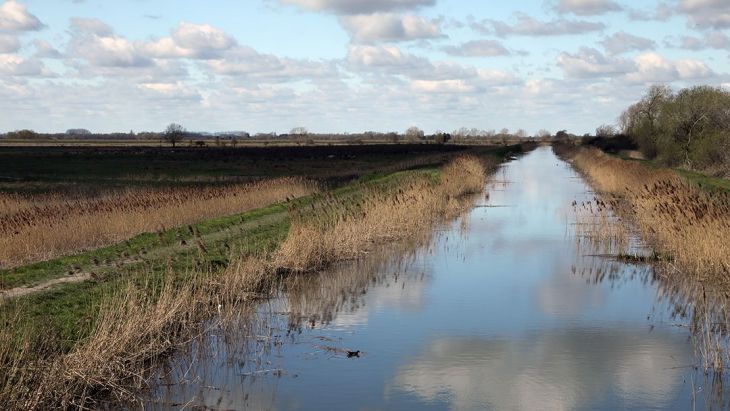The Cambridgeshire Fens have not always been so hospitable. Until the 1600’s, this region was a low-lying swamp, covered with reeds and sedge where hardy locals grazed animals in summer and caught fish in winter. Then Dutch engineers were brought in to drain the land so wealthy landowners could make more money.
The soils that emerged were carbon-rich, formed by centuries’ worth of plants trapped underwater and transformed into peat. Farming it today is only possible because hundreds of pumping stations, combined with thousands of miles of watercourses, keep the water moving out to sea.
But now that the land isn’t waterlogged any more, the soil is releasing huge amounts of greenhouse gases into the atmosphere.
In 2019, emissions from UK peatland as a whole were estimated at 23.1 million tonnes, adding 3.5% to the UK’s total emissions.
“The Fens are a UK hotspot for carbon emissions from the land,” says Marquand. “I think people understand that if we're burning fossil fuels, we're emitting carbon dioxide into the atmosphere, and that's a greenhouse gas that warms the planet. But what isn't so well-known is how land use affects emissions.”
“The ancient Fen system was like a natural canning process, and that can has been opened because the Fens have been drained. Trapped plant matter is now exposed to the air, and its carbon is being converted into carbon dioxide,” says Marquand.
This is bad for farming. The soil is becoming degraded as it loses carbon into the atmosphere, as well as being eroded away by strong winds and rains.
“If your only goal was to prevent greenhouse gas emissions in the Fens, you would re-wet them,” he says, “because wetland soils can store a lot more carbon than the atmosphere. But that would reduce food production to near zero - it's actually a terrible idea. Restoring some areas could be a way to draw carbon back out of the atmosphere. We just need to work out what conditions to keep the land in to do this.”
Marquand is studying the processes in the soil that produce and consume greenhouse gases. By analysing soil samples taken across the Cambridgeshire Fens, he hopes to identify which processes are at work, where, and the rate at which they’re happening. The aim is to contribute to policy recommendations that highlight places where it would be practical – and worthwhile – to change the way the land is managed.
“Rather than making a policy decision based on the instinct that raising the water table reduces carbon dioxide emissions, which is something people say a lot, I want to put numbers on it. For example, raising the water table by 20 centimetres will reduce emissions by 10%. That would be a great way to quantify the impact of different approaches.”







